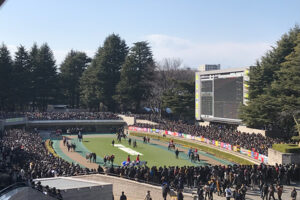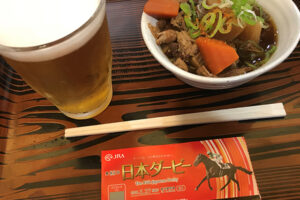Do you like gambling?
I’ve placed small bets on poker, roulette, football games and horse racing in foreign countries such as USA, Malaysia and Germany.
Private gambling is forbidden in Japan. There are no casinos although Integrated Resorts Promotion Law legalizing casino gambling officially took effect several years ago. Several public opinion polls have reflected concerns about the risk of gambling addiction. It’s estimated that there are about 5 millions of Japanese people with the gambling dependence syndrome.
Many people, however, enjoy publicly-operated horse, motor-boat, bicycle and motorcycle races. In addition, private pachinko parlors are widespread in Japan and are always crowded. There are two kinds of machines at the parlors: pachinko and slot machines. Pachinko is a vertical pinball game. You can call it “neighborhood casino” because balls and coins you win can be exchanged for prizes and money.
Pachinko is undoubtedly amusement for ordinary people and there is nothing wrong with enjoying it. But its legal status is rather unclear. Although pachinko parlors can give designated prizes, awarding cash would make it gambling. In fact, players usually sell their prizes to second-hand shops always located near the parlors. Of course, all parlors deny any association with the shops.
Under the state of emergency declaration due to the coronavirus pandemic in Japan, many pachinko parlors were voluntarily closed, but some parlors didn’t stop their operation. They were severely criticized by many people not only because of the risk of spread of infection but also because of the doubtful legal status.
On the other hand, horse racing had been operated without spectators. Sales of horse-race betting tickets fought well in spite of the severe condition because many fans who visited racecourses or outside betting ticket counters purchase betting tickets on-line now. Horse racing has become one of precious weekend amusements for ordinary people.
Horse racing is one of my hobbies. I’ve enjoyed it for about 30 years since I was a university student. I watched so many big races at Fuchu (Tokyo) or Nakayama Racecourse.

Some Grade I races such as Japanese Derby and Arima Kinen have drawn more than 100K spectators. Only the rich can usually become horse owners, but most of horse racing fans are ordinary people. Horse racing in Japan, unlike that in Europe such as UK, Ireland and France, or that in the Middle East such as Dubai and Saudi Arabia, is not for the upper classes.
I believe that Japan Racing Association operates horse-racing most successfully in the world. Arima Kinen must be one of year-end features. The sales of the Grade I race in 1996 reached about ¥88 billion, listed in Guiness World Records. You can enjoy food at every racecourse and even make your small children enjoy there.

I felt sad to be unable to see big races live at Fuchu or Nakayama due to the COVID-19. But the bustle of the racecourse at the big races has almost returned to pre-pandemic times.
In addition, smartphone games and anime “Uma Musume Pretty Derby” that turned the famous racehorses into beautiful girls became popular a few years ago, and many young people who are interested in real horse racing can be seen at racecourses. It can be said that horse racing in Japan has established itself as a pastime that transcends generations.

Comment